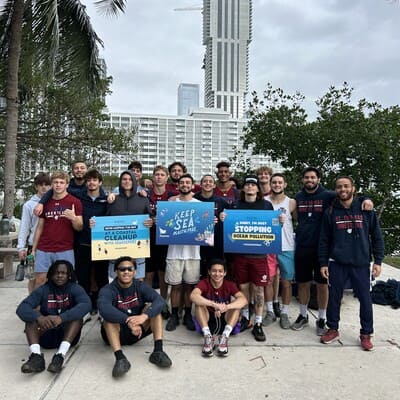SeaKeepers Monthly Margaret Pace Cleanup
Miami, Florida
January 14, 2024
Overview
On Sunday, January 14th, 2024, The International SeaKeepers Society held our monthly cleanup at Margaret Pace Park. We were joined by 62 volunteers, including many members of the St. Thomas Men’s Wrestling Team and some of our Junior SeaKeepers. After a safety briefing, our volunteers grabbed gardening gloves and bags and buckets to share and set out in all different directions in the park to look for trash. The bags started coming back quickly, with all types of debris, from plastic and glass bottles and aluminum cans to hundreds of cigarette butts, bottle caps, and pieces of plastic or styrofoam. We were able to fill 8 trash bags with 141 pounds of this debris, which was all fairly light, indicating just how much trash we found. If it weren’t removed, this trash could easily enter Biscayne Bay at this coastal park, especially on a windy day like this one. Many of our volunteers used Marine Debris Tracker while cleaning and logged over 2,300 pieces of trash during this cleanup, creating important data that reflects the severity of the marine debris crisis. Participating in coastal cleanups is a great way to reduce marine debris, but continuing to make sustainable choices when shopping, such as avoiding single-use plastics when possible, is the best way to reduce the amount of trash that will end up in our waterways. We are grateful to all of our volunteers who attended the cleanup and got their hands dirty, we could not do it without you!
Outing Goal
Marine Debris Tracker is a data collection app that allows the general public to contribute to an open-date platform and scientific research by recording the different types of litter, specifically plastic pollution, that they find in either inland or marine environments. Marine Debris Tracker was developed by the University of Georgia’s Jambeck Research Group, which SeaKeepers worked with in 2021 when the Jambeck Research Group collaborated with Ocean Conservancy to assess Miami’s plastic waste management, known as a Circularity Assessment Protocol. SeaKeepers again assisted the Jambeck Research Group’s Circularity Informatics Lab in 2022 with another Circularity Assessment Protocol in the Florida Keys. The researchers of the Jambeck Lab use the Marine Debris Tracker app to record their data, and with citizen scientists also using the app, more data can be collected in different areas. Using Marine Debris Tracker at our cleanups involves community members in creating a bigger picture of plastic pollution, and provides the means for new scientific findings to be generated as well as for effective local legislation to be informed. SeaKeepers is excited to be incorporating this app at our cleanups and continue our mission of coastal education, protection, and restoration. In this cleanup, 34% of volunteers participated in using the app to record data.


You must be logged in to post a comment.